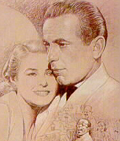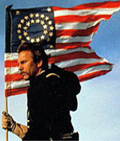|
Study Guide -
The Searchers (1956)
Director : John Ford
Stars :
John Wayne .... Ethan Edwards
Jeffrey Hunter .... Martin Pawley
Vera Miles .... Laurie Jorgensen
Ward Bond .... Rev. Capt. Samuel Johnston Clayton
Natalie Wood .... Debbie Edwards (older)
Henry Brandon .... Chief Cicatrice (Scar)
Preparation :
Read the movie reviews by Roger Ebert, Filmsite.org and the article on the Comanche Indians.
Historical/Social Significance :
"... captures beautifully the bitter spirit of the long battle for Comancheria."1
Cultural historian Phillip Mitterling has identified (The Searchers as) Ford's eloquent statement in support of the Civil Rights Movement.2
"It is likely that Ford was commenting not only on the post-Civil War Indian Wars ... but also on the International Cold War and the Civil Rights Struggles of the 1950's.3
Synopsis :
Set in Texas, 1868, this is the story of Ethan Edwards who searches for five years for his niece Debbie, who has been kidnapped by the Commanche whose leader is Scar. Ethan's companion Martin Pauley begins to suspect Ethan's motivation as the journey continues.
Guided Questions for Viewing :
Assessment questions will be based on the following :
-
Pay close attention to the opening and closing shots of the movie, where Ethan is pictured outside the doorway of the homestead. Comment on the symbolism of these scenes with reference to Ethan being on the outside of civilization.
-
Who is the hero of The Searchers? Comment on this with examples from the movie.
-
Martin: "Debby's your blood kin."
Ethan : "Not anymore she's not."
Comment on the above dialogue and what it means in context of the overall plot of the movie.
-
Cultural historian Phillip Mitterling has identified (The Searchers as) director John Ford's eloquent statement in support of the Civil Rights Movement. In view of the fact that the movie was made in 1956 comment on this statement.
-
It has been suggested that Ethan Edwards signaled the decline of the traditional Western hero along with classic western that justified the "taming" of the land and the conquest of the native people in order to build civilization.4 Comment on this statement with reference to The Searchers
-
The Searchers include three or four episodes of comic relief that some people felt detracted from the overall movie. Describe two of these scenes and explain why you think Ford put them in and if you think they "worked".
-
Some critics feel that the ending of The Searchers was "Hollywoodized" with Ethan returning Debbie home even though there is no sign throughout the movie that he would do this. Do you feel that the movie would have been better if Ethan killed Debbie? Explain your answer with reference to the movie and the times in which it was made.
-
"A cover story in New York magazine called it the most influential movie in American history. And yet at its center is a difficult question, because the Wayne character is racist without apology--and so, in a less outspoken way, are the other white characters. Is the film intended to endorse their attitudes, or to dramatize and regret them?" Roger Ebert.
What do you think the movie was trying to portray?
Sources:
1. Roquemore, Joseph. History Goes To The Movies 2000. Broadway Books. p 110
2. www.library.csi.cuny.edu/dept/americanstudies/lavender/searchers.html
3. www.couchcowboy.com/Classics/searchers.htm
4. Lawrie, Katherine. "Hero, Text and Ideology in John Ford's The Searchers". December 1995. www.film.queensu.ca/critical/laurie2.html
Ebert, Roger. "The Searchers." Jan. 1, 1956. http://rogerebert.suntimes.com/
|



